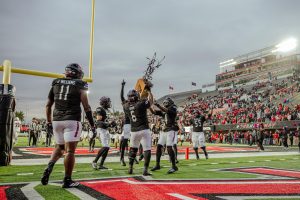Athletes — get your study on or pay the price
January 26, 2005
Beginning in the 2005-06 school year NIU and all NCAA teams could lose scholarships and even Division I status if they don’t graduate enough student athletes.
Calculated yearly, each school must comply with the NCAA to show the school graduates at least 50 percent of its athletes, according to the new Academic Progress Rate approved Jan. 10 by the NCAA Division I Board of Directors.
“The new standards the NCAA is putting into effect are good and will allow schools across the country to keep helping their students towards graduating,” NIU men’s basketball coach Rob Judson said.
NIU is graduating its student athletes at a rate of 70 percent, Judson said. That compares to NIU’s overall student graduation rate of 53 percent.
With the new rule, the type of athletes recruited at NIU will likely change, Huskie wrestling coach Dave Grant said.
“If you’re going to be hurt with scholarship infractions, it will affect your recruiting as far as not taking a risk on a marginal athlete academically.”
The NCAA will release the official formula to prove each school is A.P.R. compliant in February. NIU’s Director of Compliance Bobbie Cesarek said she believes NIU will meet the standards yet won’t know for sure until February.
The rule will be implemented on each team individually and not the university as a whole, Cesarek said.
All cases will be treated separately with the severity of each penalty depending on the level of the offense. The first time a school fails to comply, the team will receive a warning. Each year failed after that, the team can lose up to 10 percent of its scholarships for the next season.
No scholarship penalties will be permanent. Schools which fail to comply for multiple years in a row face harsher penalties.
A three-time offender can find himself or herself being banned from post-season play. Teams that fail to comply in four consecutive years risk losing Division I status.
“This rule was created as a result of men’s basketball programs like Cincinnati and Arkansas,” Cesarek said. “Schools who traditionally recruit athletes to play for a couple of years than leave for the NBA without graduating.”
It will also attempt to stop football players who drop out of school after finishing their final season, Cesarek said. The A.P.R. will reach as far as to hold schools accountable for players whose eligibility has expired.
This is the case with former Huskies basketball player Leon Rodgers who last played at NIU in 2002. He is now playing professional basketball in Europe but still taking classes towards graduating, Judson said.
Robert Hemenway, chair of the Board of Directors for NCAA Division I athletics, views this as a critical step. Admitting this is much needed to strengthen academic standards, his goal is to keep student athletes on track to graduate.
“NIU is right on track, and this new rule will not be affecting us,” Judson said.






